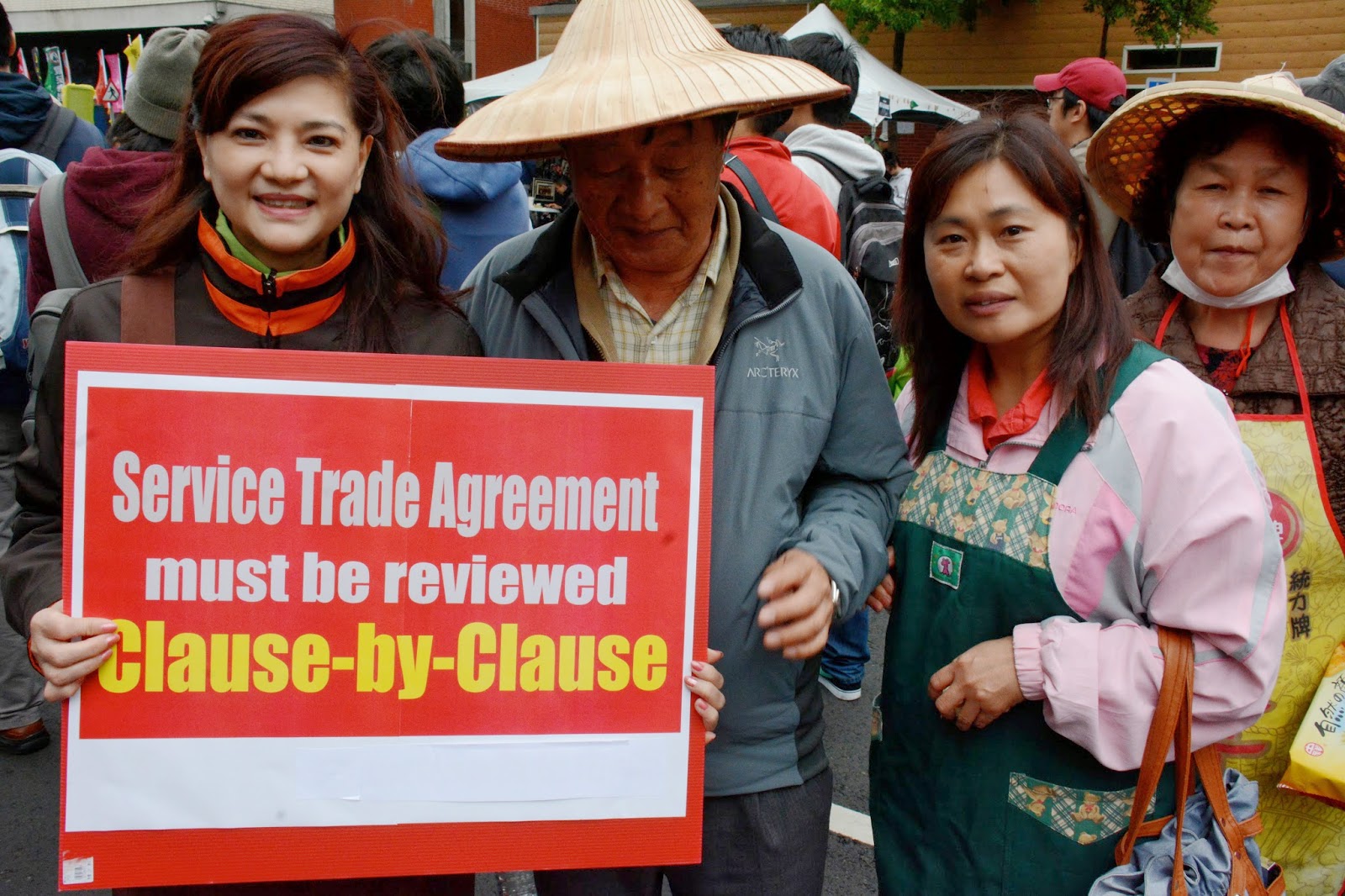Gangster-turned-politician Chang An-le now appears to be a factor in the ongoing crisis at the legislature
One thing that’s
been on a lot of people’s mind in recent days (it certainly has been on mine)
is how President Ma Ying-jeou, who has backed himself into a tight corner over
the Cross-Strait Services Trade Agreement (CSSTA), will get out of this. As
I’ve already argued, widespread criticism of the police crackdown on protesters
occupying the Executive Yuan on March 23-24 makes it unlikely that force will
be used again to expel the thousands of activists in and around the Legislative
Yuan. But what if someone else were to do that for them?
Since day one of
the occupation of the LY on March 18, gangster Chang An-le (張安樂), the leader of the Unification Party and ex-Bamboo Union leader,
has agitated against the protesters. On at least two occasions his goons turned
up at the site and attempted to pick a fight with the students, threatening
them with knives, firecrackers, and homemade bombs.
Chang, who
should be in court defending himself, was released on bail in June 2013 a few
hours after his return to Taiwan, which he’d fled amid a nationwide crackdown
on organized crime 18 years ago. Rather than be tied up with lawyers and court
summons, Chang, also known as “White Wolf” (白狼), has appeared on TV shows, brushed elbows with local KMT
politicians, bought support with “humanitarian” aid, and opened campaign
offices around the country — even in Tainan, the “heartland” of Taiwanese
independence.
And he’s flexed
his old unreformed muscles by threatening various people, including the leaders of
an NGO fighting for the rights of laid-off workers, the Dalai Lama, and Tainan Mayor William Lai (賴清德).
Chang himself showed up briefly after the first goon “knife” incident at the
LY, surrounded by individuals you’d never trust your daughter with (the same
thug-looking types who surrounded him when Chang sat a few meters away from me
at a popular drinking hole in Taipei a few months ago).
With no end of
the occupation at the LY in sight, Chang has now called upon 2,000 of his “friends” to
retake the legislature tomorrow, April 1. Given who his friends are, it’s
difficult to imagine that they would do so through gentle persuasion (the irony of a man who advocates for unification with an authoritarian regime seeking to liberate the legislature is an unctuous one). “Netizens”
with ostensible ties to Chang have also now called for the occupation of
movement leader Lin Fei-fan’s home in Tainan. The message was left on the “White
Justice Alliance” Facebook page. Ahead of the movement’s mass protest on
Ketagalan Blvd and around the LY on March 30, Lin had received a text message
on his cell phone threatening that “blood would be spilled” if their proceeded, a
threat that was taken seriously enough as to warrant police protection for the
two students.
One interesting
thing about Chang’s press conference is that two of the individuals who were on
a “workers’ union” panel with him have been attacking Lin Fei-fan and Chen
Wei-ting, another student leader, since the latter led a movement seeking to
counter the pro-China Want Want China Times’ acquisition of Next Media’s Taiwan
operations in 2012. Both of them, New Chinese Children Association head Wang
Puchen (王炳忠) and Chinese Culture University history
graduate student Lin Ming-cheng (林明正), have been strong proponents of controversial changes to textbooks that promote a more “Chinese” identity. The pair are members of the
pro-unification New Party’s Youth Alliance.
As I wrote last
week, a series of attempts to block the posting of evidence about police abuse
during the raid on the EY on various Internet platforms (including Wikipedia) were
traced back to the China Times Group.
The truly
worrying thing about this development is that everybody knows that Chang is a
proxy of the Chinese Communist Party (CCP) and that he has brought back to
Taiwan practices of terror and intimidation that are sadly commonplace in China.
United Front efforts aside (China watchers are well aware of the role of organized
crime in Beijing’s United Front work), the White Wolf’s involvement in politics
is a threat to social stability and national security. Not only do his actions
put the lives of young Taiwanese at risk, they also pose a threat to the police
officers that are currently deployed at the LY.
The
responsibility for any resulting injuries to the students or police officers
would rest squarely on the shoulders of the Ma administration that should long
ago have dealt with Chang’s return the proper way. Until the situation changes,
we can only conclude that Ma’s failure to deal with Chang, and the National
Police Administration’s turning a blind eye to his nefarious activities, are
the result of a decision to allow organized crime to do the administration’s
dirty work. Another possible explanation is that the authorities do not understand the damage that someone like Chang, who evidently does not understand the workings of democracy, can do to society. (Photo by the author)
























